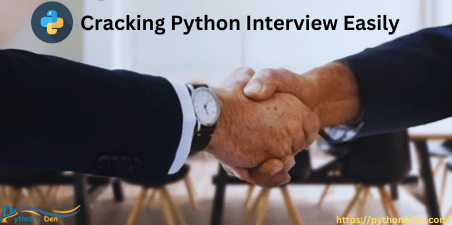Cracking Python Interview Easily
Python is a robust and popular programming language that is becoming more and more in demand in the computer sector. As a result, there are many job prospects related to Python, and becoming a Python developer might be very difficult. It’s critical to thoroughly prepare for your Python interview in order to improve your chances of success. In this blog, we will discuss some valuable tips and strategies to help you crack a Python interview with confidence and ease.
Follow Below steps to cracking Python Interview Easily
Understand the Job Requirements
Make sure you have a firm grasp of the job requirements before starting the interview preparation process. To find out whatever precise Python abilities, frameworks, libraries, and concepts the company is looking for, carefully read the job description. This information will enable you to concentrate your preparation efforts on the areas most crucial to the job.
Refresh Python Fundamentals
Brush up on your Python fundamentals, including syntax, data types, control structures, functions, and object-oriented programming (OOP) concepts. Ensure you have a solid understanding of Python’s built-in functions and commonly used modules.
Practice Coding
Any Python developer needs to be able to write clear, effective code. To improve your problem-solving abilities, consistently practice coding challenges. There are several coding challenges available on websites like Python’s Den, LeetCode, HackerRank, and Codewars that mimic real-world situations. Python should be used to address problems; pay attention to readability and time complexity.
Know Python Libraries and Frameworks
Learn about the main Python frameworks and libraries that are used often in the field. Some examples include NumPy, Pandas, Django, Flask, TensorFlow, and Scikit-learn. Understand their use cases, functionalities, and how they can be applied to solve specific problems.
Be Prepared for Algorithmic Questions
Many interviews contain questions about algorithms and data structures in addition to Python-specific inquiries. Examine well-known methods for sorting, searching, and traversing graphs. Recognize how these algorithms are complex in both time and space. Work on constructing data structures including trees, stacks, queues, linked lists, and arrays.
Demonstrate Knowledge of Database Concepts
Databases are a common tool used by Python developers. Learn about NoSQL databases and SQL (Structured Query Language). Recognize ideas such as normalization, indexing, and table design. Understanding how to use Python tools like SQLAlchemy to communicate with databases is also beneficial.
Stay Updated with Industry Trends
Keep abreast on the most recent developments and trends in the Python ecosystem. To learn about new Python features, industry standards, and up-and-coming technologies, follow well-known Python blogs, read books, and research internet resources.
Prepare for Behavioral Questions
Technical proficiency by itself does not ensure success in a Python interview. Be ready to respond to behavioral questions that evaluate your approach to solving problems, capacity to work in a team, communication abilities, and ability to handle challenges. Think back on your prior experiences, and be prepared to provide instances to support your claims.
Mock Interviews and Feedback
With mentors, coworkers, or friends, practice mock interviews. By simulating an interview setting, mock interviews provide you the chance to hone your responses, boost your delivery, and develop confidence. In order to determine areas for improvement, ask for feedback on your performance.
Ask Intelligent Questions
At the conclusion of the interview, the interviewer will frequently inquire whether you have any final queries. Make up a list of well-thought-out inquiries about the business, the team dynamic, the project expectations, or anything else pertinent to the position. Intelligent inquiries help you learn more and show that you are interested in the job.
Last Words
Cracking Python interview requires a combination of technical knowledge, problem-solving skills, and effective communication. By following the tips mentioned in this blog, you’ll be well-equipped to tackle Python interviews with confidence and ease. Remember to practice, stay updated, and showcase your passion for Python development.
Related Blog:
Top 15 Python Interview Questions

